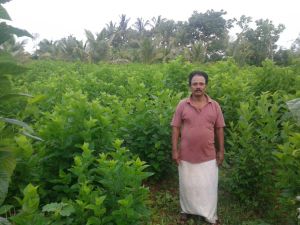A Farm in Suganahalli village, 25 km from Gadag, Karnataka is popularly known as Knowledge Bank. There are many visitors mainly students, professors, experts and farmers at the farm entire year to learn the farming techniques that books can’t teach!
The farm spread in 7.5 acres has fruit orchard, sericulture unit and a small dairy division. Vegetables are grown as intercrops across the farmland. Manure and pesticides are produced in-house. Borewells are recharged to deal with the water scarcity issues.
The farm belongs to a progressive farmer Mr. Basavaraj Chandrappa Navi, who initially worked at PWD and private company but quit the job aspiring to earn high respect and more money. Eventually he did gain both through farming. “I feel proud to be a farmer today. It is a myth that farming is not profitable! I want to change this lame statement to ‘any farmland can mint money if the farming practices are right’,” he asserts.
Mr. Basavaraj started his farming endeavor with sericulture. He cultivates mulberry plants. His entire farm is organic since the very beginning in 2010. Soil stays fertile, porous and helps in rejuvenating the ground water if organic farming is practiced in the farm. “It is best technique to cope with water crisis,” he opines.
Farm has Jawari cows (local breed). These milking cows are fed with green fodder precisely azolla, napier and guinea grass to enhance the milk yield and nutrient content. “I put soil and cow dung in a tank. Fill it with water and sow azolla seeds. Within a week I get good yield. Azolla is an excellent feed for milking cows,” highlights Mr. Basavaraj.
Entire farm is fenced with 100 trees each for sagwan, coconut and neem. Sapota, banana yelakki, G9 and mangoes are the fruits grown in the farm. “Mango and sapota trees are 10 years old and have started giving good yield. Sagwan trees are 3ft wide and 20ft height,” he shares.
Sapota and mango are planted at a distance of 30×30. “So I intercrop it with vegetables. I also grow green grams and napier grass,” he shares. “Mulberry plants need shade hence I have intercropped it with coconut tree.”
Borewells are the main source of water in the farm. “I have dug a pit 10ft circumference and 3ft depth around the bore well. At the bottom of the pit I have added one layer of boulders, next sand layer followed by small jellies. Last layer is again of sand. When it rains the water seeps inside the pit,” he elaborates on water recharging system.
Vermicompost, jeevachaitanya compost, Japan maadari compost, vermiwash and brahmastra are the different farming inputs produced and used in the farm.
Japan maadari compost is prepared in the tank of 20ft long, 4ft wide and 3ft tall. In the bottom of the tank, plant twings and coconut leaves are spread to hold water. On this a layer of cow dung slurry or biogas plant slurry is added. Followed by layer of other wastes (farm waste) and lastly compost culture (trichoderma and fertile lake soil) is added. It needs to be kept damp hence water should be sprayed as required. After 3 months, the compost turns into manure having the texture of tea powder. “This composting method gives 2 tons manure. I use 4-5 bags for 1 acre of land. It can be repeated 3-4times a year,” he affirms.
Mr. Basavaraj has developed a bio digester plant, 30ft long, 12ft wide and 3ft depth. In the bio digester all farm waste (wet and dry), ashes, cow dung and cow urine is mixed together. It is stirred occasionally. After 40days the waste turns into slurry that is fed to the plants through drip irrigation so that it reaches directly to the roots. “By using these farm produced manure the quality and quantity of the yield is very good,” he states. “I also use the excreta of the worms for manure which many (90%) of the farmers do not know. In his vermicompost unit, 10% of silk worm excreta + 10% sticks of mulberry plant and 80% of farm waste is added along with earthworm Eudrilus Eugeniae.
All farm products are sold to organic outlets, traders, neighbours and visitors. “We do not want to encourage traders but due to lack of time I sell the products to agents also,” he says.
He has received many awards and also is motivating fellow farmers to start chemical free farming. He has started Someshwar Organic Farmers Association along with other organic farmers in the same village. The association strives to sell organically produced farm products directly to the end user at a premium price.
In coming years, Mr. Basavaraj is focused on increasing the farm earnings. “I started farming on 2.5 acres but now it is expanded to 7.5 acres. The acreage has been increased with the money earned from the fields so farming is surely profitable. It is all about the positive mindset, upgrading oneself with knowledge and applying the learned techniques on the farm. Work smart and money will come!” he concludes.
Contact details:
Knowledge Bank
Head Post Suganahalli, Taluk Shirasatti, District Gadag – 582 112, Karnataka
Mobile: 7259968715
source and credits - Agricultureinformation archives







0 Comments